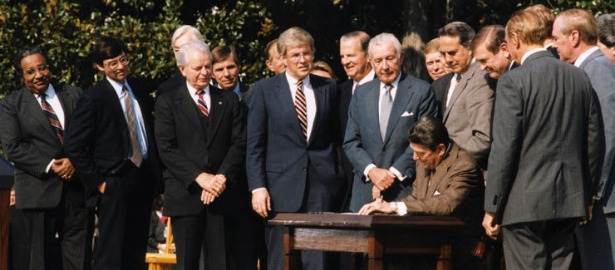Op-Ed: Tax Reform: 25-Years Old Today, and Ready for a Facelift
The Atlantic | October 22, 2011
We've spent a quarter-century undoing the smart, simple tax reforms of 1986. Here's to hoping Washington can act like its old self before it's too late.

Today marks the 25th anniversary of the Tax Reform Act of 1986, the last major overhaul of the federal tax code. Signed into law by Republican President Ronald Reagan and championed by Democrats such as Bill Bradley and Richard Gephardt, the enactment of the law was a remarkable bipartisan achievement. It dramatically lowered marginal rates with a top rate of 28 percent, removed millions of working poor off the tax rolls, and simplified the tax code by closing a myriad of tax loopholes.
Unfortunately, many of the loopholes that the 1986 reform eliminated have returned, with a few extra ones slipped in for added measure. Since the law's enactment, more than 15,000 changes have been made resulting in a tax code that is several volumes longer than The Bible and requires 71,684 pages to spell out the rules. Because of this complexity, 80 percent of American households use a tax preparer or tax software to help them prepare and file their taxes.
But complexity is only part of the problem. The other is cost. Year-after-year, elected officials in Washington shovel more tax breaks into the trough (tax breaks now account for $1.1 trillion) causing both deficits and marginal tax rates to be higher than is necessary or optimal for the economy.
Despite the obvious need for tax reform, some in Washington are advocating that congressional Super Committee charged with finding a balanced deficit reduction package not tackle tax reform. They claim it's too complicated, too hard, or too long-term.
They're wrong. Delaying tax reform will only make implementing the solution harder and more painful. There has never been a better time in which to enact tax reform. The Super Committee was created as part of last summer's debt ceiling agreement to require Congress to vote up or down, without amendment, on tax reform as part of its plan to address the federal government's medium and long-term fiscal imbalance. This BRAC-like power is designed to limit the influence of special interests whose work in the past has littered the tax code with loopholes. This opportunity is not likely recur anytime soon. It is, therefore, in the Super Committee's interest to act now rather than wait.
Tax policy is complicated. But lawmakers on the Super Committee don't have to start from scratch. There are already a number of plans that would dramatically lower marginal rates for individuals and businesses, eliminate tax expenditures, and grow revenues for deficit reduction. For example, the Zero Plan put forward by the Bowles-Simpson Fiscal Commission (what some refer to as 1986-style tax reform on steroids), would lower marginal rates and simplify the tax code from six to three tax rates, tax capital gains and dividends as ordinary income, eliminate the burdensome Alternative Minimum Tax, align the corporate and the top individual rate, move our corporate tax code to a territorial system, and eliminate all or most of the $1.1 trillion in tax expenditures.
Furthermore, the Super Committee does not to choose between writing a full tax reform bill in two months or agreeing to an open ended process for tax reform in the future. The Bowles-Simpson Fiscal Commission, Gang of Six, and others have proposed setting up a procedure for expedited consideration of tax reform that sets out parameters and criteria for what tax reform must include in addition to the revenue target while leaving details to the Senate Finance and House Ways & Means committees. Such an approach ensures true tax reform will be voted on while leaving the details to those who have the expertise to get the job done.
In addition, fundamental reform, which broadens the base by reducing deductions, credits, exemptions, and other tax expenditures; simplifies the code; and lowers individual and corporate tax rates, has the potential to substantially improve economic growth. The Joint Committee on Taxation has estimated that income tax reform that wipes out most tax expenditures in order to lower marginal rates, could increase the size of the economy by 1.2 to 1.9 percent of GDP over the medium-term, and even more over the long-term.
Finally, the new revenues generated by fundamental tax reform would help the Select Committee to achieve substantial deficit reduction. The Super Committee is charged to identify $1.5 trillion over ten years in deficit reduction, though $1.2 trillion over ten years would be enough to avoid an automatic sequester. While this would represent significant savings, members should be shooting t at least double, or triple this target in order to put the debt on a sustainable course. Relative to a realistic budget baseline, it would take about $3 trillion in deficit reduction just to reduce the debt to below 70 percent of GDP by 2021 and put it on a modestly downward path. Identifying an amount of deficit reduction significant enough to put the debt on a downward path will almost certainly require looking beyond discretionary spending to major entitlements, other mandatory programs, and ways to produce more revenue.
No doubt taking up tax reform will be a difficult challenge for the Super Committee. But the benefits of enacting fundamental reform are worthy of the effort. Besides, enacting tax reform is a whole lot better for the economy, and for politicians of both parties, than continuing the on-going fight over extending the Bush and Obama tax cuts for another year.


